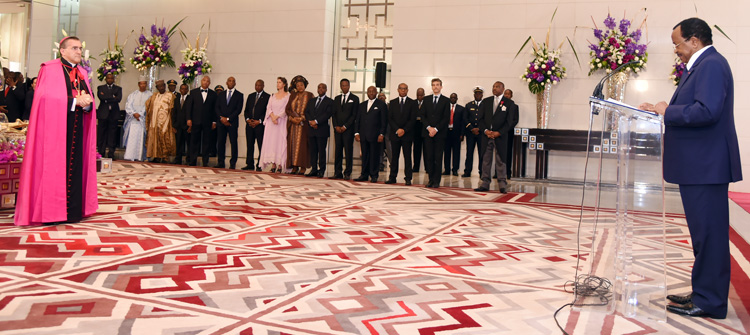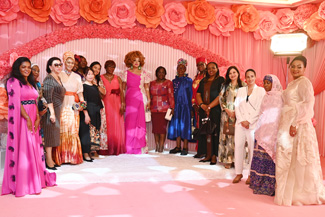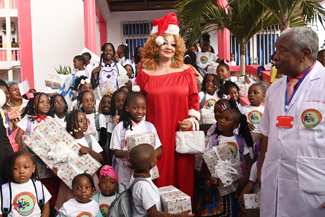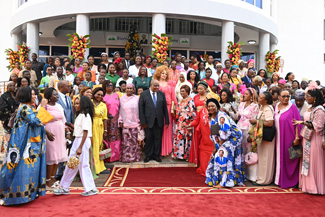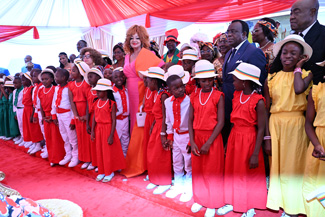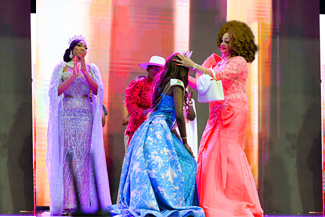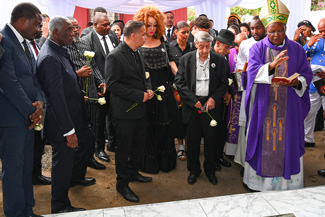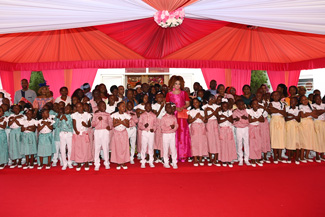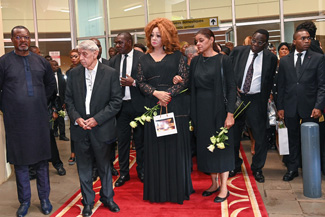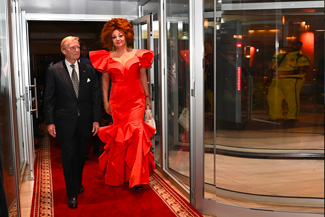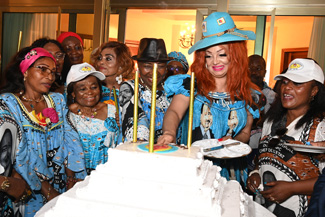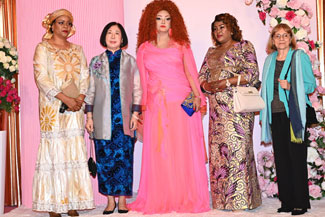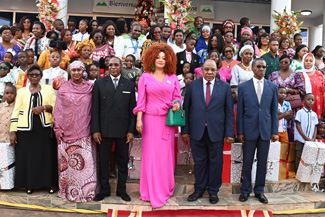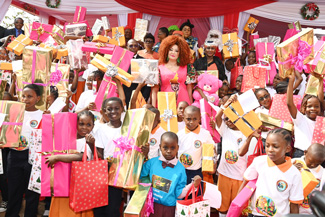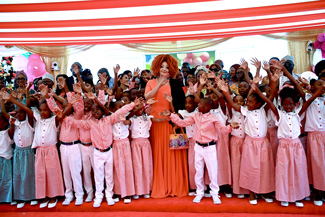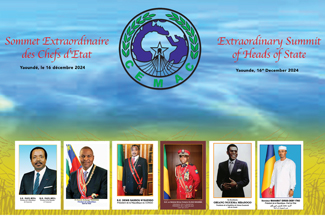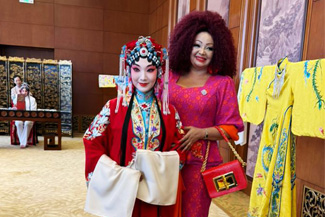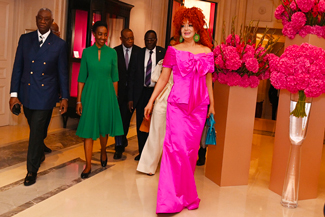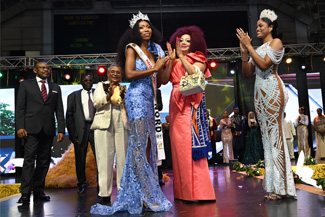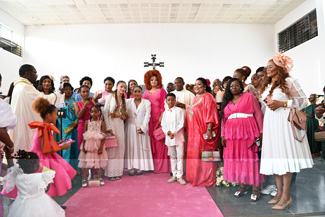The Dean of the Diplomatic Corps,
Distinguished Members of the Diplomatic Corps,
It is always a great pleasure for me to welcome you to this venue on the occasion of the traditional ceremony of presentation of New Year wishes by the Diplomatic Corps. The ceremony affords us an opportunity each year to review the global situation together.
Right away, I would like to thank your Dean for his subtle analysis of the said situation and for his words of encouragement for Cameroon. Also, the wishes he has extended, on your behalf, to my country, my family and me, go straight to my heart.
Your Excellency, Dean of the Diplomatic Corps, you have underscored our people’s exploit in rebuilding their unity despite their multiple diversities. As I have always stated, this unity forms an integral part of our people’s very existence.
I have repeatedly urged my compatriots to jealously preserve this unity.
Our diversity forms part of our identity.
Our people are committed to these two fundamental values, namely unity and diversity.
In the spirit of dialogue that I have always advocated, I will, with all my compatriots, continue making every effort to strengthen our desire to live together.
Distinguished Members of the Diplomatic Corps,
Unfortunately, the essentials of global economics have hardly changed over the past months.
Three issues, namely insecurity, economic instability and environmental degradation, remain the core concerns of peoples and their leaders.
Regarding security, public opinion is showing grave concern about the persistence or even heightening of tensions, notably in the Middle East and in Africa.
In the Middle East, and more precisely in Syria and Iraq, what we now have is a major war raging between various antagonists. This horrific war is claiming scores of innocent lives and causing waves of refugees. At present, the regime in Damascus is on the offensive and appears to have the upper hand. However, the situation is so complex that it is foolhardy to make any prediction.
No one will regret the possible defeat of the Islamic State which is one of the poles of international terrorism.
However, it is clear that the return to peace will require great diplomatic efforts and consideration of the political, religious and economic interests of the various parties involved. In this regard, the rapprochement between Damascus and the Syrian Opposition, endorsed by the Security Council, is a step in the right direction.
We are aware that the spread of terrorism is not unrelated to the situation in the Near and Middle East. The attacks carried out in Europe, in the United States, in Turkey and in Africa are often claimed by the Islamic State organization. If it collapsed, this could facilitate the eradication of movements that have pledged allegiance to it.
In Africa in particular, be it Boko Haram or various organizations that are active in Libya and the Sahel, the demise of the Islamic State organization would definitely deal a severe blow to the jihadi underworld in our continent.
This possibility will require the adoption of a long-term strategy to combat terrorism by all countries facing this scourge.
We must at this point stress the commitment of the major powers which have fathomed the precise extent of the jihadist danger. It represents a real threat to the security of states and global peace.
Also worth mentioning is the mobilization of international organizations, foremost among which is the United Nations Organization, which have included terrorism on their security and social agenda.
Lastly, we must pay tribute to humanitarian organizations that came to the rescue of refugees or displaced persons fleeing fighting or persecution.
The global economic outlook is also a matter of great concern in public opinion.
The optimism that prevailed in the early days of responsible globalization has largely disappeared. While acknowledging that it has boosted global trade and reduced poverty in many countries, it is now being blamed for causing economic instability and widening inequalities.
Generally, the current chaos is blamed on uncontrolled deregulation of the global economic and financial system, which is also responsible for the crisis that spread in 2008 and whose effects seem to linger on.
- Globally, growth, with some exceptions, is slowing down.
- In Europe, as the case may be, it has more or less stagnated.
- For their part, emerging countries have had to review their ambitions and revive their economies by stimulating consumption.
- Those developing countries whose economies rely solely on oil and raw material exports witnessed a slump in their revenues due to a sharp drop in prices.
Such was the case with many Central African countries, which warranted the holding, on Cameroon’s initiative, of an extraordinary summit of Heads of State in Yaounde on 23 December 2016.
To reverse the negative trends in the economy of the sub-region in a sustainable manner, the Heads of State adopted measures combining an appropriate fiscal policy, a suitable monetary policy and stronger international cooperation.
They also prescribed actions to diversify their economies and make them more competitive and less vulnerable to exogenous shocks.
- In many countries, the trends are not expansionary:
- production is declining;
- investments are stagnating;
- unemployment is persisting;
- inequalities are widening;
- fear of being downgraded is spreading.
Under such circumstances, it is not surprising for discontent to extend to the political sphere. Protectionism is gaining ground. There is an upsurge in populism and nationalism.
Of course, States are implementing, wherever they are able to, recovery policies which often are hampered by public deficits and the debt burden. The major international economic and financial organizations are well aware of the seriousness and urgency of these problems. However, the needs to be met are so huge that they seem overwhelmed by the scale and complexity of the task.
Disruptions in globalization seem to have provoked a kind of backlash whereby States may be tempted by isolationism. Obviously, such a trend would negatively impact growth and international trade. To avert such a situation, the solution would undoubtedly be to reintroduce some degree of regulation in the global economic system for better controlled globalization.
Circumstances compelled the international community to focus its attention on security and economic problems. For all that, it did not abandon major issues related to the future of planet Earth, namely sustainable development and environmental protection.
The recent session of the United Nations General Assembly afforded world leaders the opportunity to review the sustainable development goals which became effective at the beginning of this year. We now have to give them "fresh impetus to transform our world".
For its part, the Francophonie Summit which was held last November discussed the ambition of building "a more just economic order through inclusive and sustainable growth". Although they are long-term objectives, it is reassuring to note that such concerns have not been forgotten.
Similarly, the progress achieved in Paris at COP21 on climate change has not remained a dead letter. It was confirmed at COP22 in Marrakech.
This key issue, which threatens the survival of the human species, will, I believe, continue to be closely monitored, especially to ensure that the commitments made are honoured.
Before concluding, I would like to say a few words about our diplomatic action on the international scene, especially concerning our relations with the African Union.
It is clear that we support the ongoing reform led by its Chairperson.
Moreover, it is our hope that the policy decision to establish the headquarters of the African Monetary Fund in Yaounde will soon become reality.
We are also working to ensure that the Continental Logistics Base to be set up in Douala goes operational soon.
We are ready to host, in Yaounde, the Inter-regional Coordination Centre for Maritime Safety and Security in the Gulf of Guinea.
These last two projects are the offshoots of the various regional security summits held this year.
The Dean of the Diplomatic Corps,
Distinguished Members of the Diplomatic Corps,
I would now like to request you to kindly convey my best wishes for the New Year to the distinguished authorities that you represent here.
I extend to you and your families my most sincere wishes for happiness, health and success in 2017.
Long live international cooperation!
Thank you for your kind attention.
Yaounde, 6 January 2017
